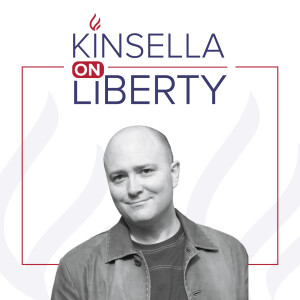
KOL421 | The Local Maximum with Max Sklar: Ep. 297 – The Fallacy of Intellectual Property
 2023-10-27
2023-10-27
Download
Right click and do "save link as"
Kinsella on Liberty Podcast: Episode 421.
This is my appearance on Episode 297 of The Local Maximum with host Max Sklar. Recorded Sep. 13, 2023, published Sep. 27, 2023. From their shownotes:
Max talks to Stephan Kinsella, a libertarian intellectual property lawyer who ardently challenges the very foundations of IP. Kinsella delves deep into the core arguments underpinning intellectual property and the inherent fallacies. They also discuss the impact of generative AI on the copyright landscape.
Transcript below.
Transcript
Max Sklar: You're listening to the Local Maximum episode 297.
Narration: Time to expand your perspective. Welcome to the Local Maximum. Now here's your host, Max Sklar.
Max: Welcome everyone, welcome, you have reached another Local Maximum. We are going to get a really interesting perspective on intellectual property today from Stephan Kinsella. He is an intellectual property lawyer who is actually against the whole concept of intellectual property that includes patents, copyright, the whole thing. Now, for those of us on the outside, there's still a lot that we need to learn about IP, like, what are all these different concepts? Why are they considered necessary by the mainstream?
So we go back to basics a little bit, go over what patent and copyright is and why you still need to use it and think about it even if you don't agree with it. And then we're going to take a turn into the issues of the day with generative AI models and how copyright law may end up getting applied to these processes, by the authorities, by the powers that be and the harm that this could possibly do.
All right. My next guest is a libertarian writer and registered patent attorney in Houston. He has spoken, lectured and published widely on various areas of libertarian legal theory and on legal topics, such as intellectual property law and international law. Stephan Kinsella, you've reached the Local Maximum, welcome to the show.
Stephan Kinsella:
Thank you, glad to be here.
Max: Yeah, really glad to have you and your work on intellectual property and copyright. First of all, that's a topic that, you know, not everyone can make it interesting for me, whenever I listen to your stuff on it, I always I always find it's more interesting. So I appreciate that. And I agree with you on a lot of things. So that's it. I just appreciate the way you present it.
You've been opposed to IP for quite a while. When did you come to this kind of full? Well, what is your full position? I think it's like, you know, no patent, no copyright? Is this your full position? And when did you come to this position? Was it before after going into IP law?
Stephan:
About the same time I was a, I was a libertarian and college and in law school, but I was always unsatisfied with the arguments for IP that I had heard by Ayn Rand and others, I assumed it was a legitimate type of property right because it was in the Constitution, and it's part of so-called capitalism, and everyone was in favor of it.
But their arguments didn't make sense to me, because, you know, most of the arguments were either well, they're either utilitarian or incentive based, or they're kind of a deontological, or principle based, like have a natural rights argument. And the natural rights argument just makes no sense because the patent and copyright expire after a certain number of years, which, which is not how other property rights work.
So it seems to me like if you're trying to do a natural rights argument, which Ayn Rand did, and then you say, but that copyright should expire in 100 years, and patent should expire in 17 years. It's weird that you just have this arbitrary number, which, of course, the government would have to make up and they have no basis for it. And if you do a utilitarian argument, then I just don't think that you never hear any evidence, you just hear anecdotes and the same old arguments, so I was dissatisfied with it.
view more
More Episodes
KOL257 | PeterMac Show: Part 3 of 3
 2019-01-20
2019-01-20
 2019-01-20
2019-01-20
KOL256 | PeterMac Show: Part 2 of 3
 2019-01-18
2019-01-18
 2019-01-18
2019-01-18
KOL255 | PeterMac Show: Part 1 of 3
 2019-01-15
2019-01-15
 2019-01-15
2019-01-15
012345678910111213141516171819
Create your
podcast in
minutes
- Full-featured podcast site
- Unlimited storage and bandwidth
- Comprehensive podcast stats
- Distribute to Apple Podcasts, Spotify, and more
- Make money with your podcast
It is Free
- Privacy Policy
- Cookie Policy
- Terms of Use
- Consent Preferences
- Copyright © 2015-2024 Podbean.com




